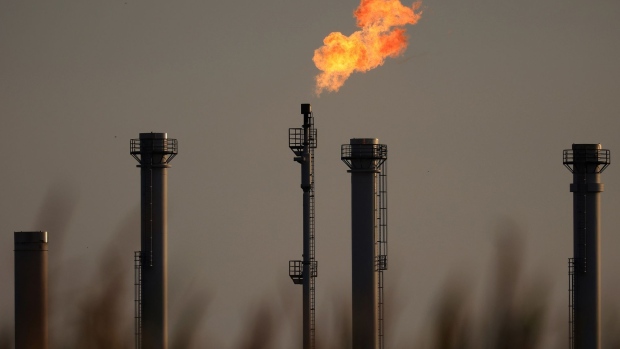Aug 26, 2022
Germany to Reassess Gas Levy After Outcry Over Energy Profits
, Bloomberg News

(Bloomberg) -- Germany is looking at restricting the companies able to benefit from a new gas levy just to those that really need the assistance, with the scrutiny following an outcry over soaring profits at some energy companies.
The government is imposing the levy on consumers to help fund aid for suppliers forced to pay higher prices due to Russia squeezing gas deliveries, but Economy Minister Robert Habeck said he’ll look into ways of preventing some gas importers from receiving the aid.
Germany initiated the plan over concerns that failures of gas companies could trigger wider disruption in energy deliveries to Europe’s biggest economy. The move has prompted a political backlash, with some members of Chancellor Olaf Scholz’s ruling coalition urging a rethink.
There have also been widespread calls for an additional tax on energy companies whose profits have soared due to the crisis, though Finance Minister Christian Lindner has ruled out such a move. Both issues are sure to be high on the agenda at a two-day cabinet retreat in Meseberg outside Berlin starting Tuesday.
Habeck said late Thursday that it’s “certainly not morally correct” that companies that have benefited from energy inflation are also asking for government handouts. Twelve companies initially filed applications for about 34 billion euros ($33.9 billion) in assistance, according to Trading Hub Europe, Germany’s gas market manager.
Goodbye Hot Showers. Here’s How Europe Is Slashing Energy Use
“All I’m saying is, let’s look at that again,” Habeck said, according to excerpts from a speech in Muenster late Thursday published by Die Welt newspaper.
“However, there is a relatively high hurdle,” he cautioned. “If we start to play games and that brings lawsuits -- and there will definitely be lawsuits in one direction or another -- and the levy gets scrapped, then we will still have the same problem: some companies and citizens will experience a collapse in gas supply.”
Saskia Esken, a co-leader of Scholz’s Social Democratic Party, said it’s “unacceptable” that some gas suppliers who are not in financial difficulty are applying for aid. In an interview with Deutschlandfunk radio on Friday, she referred to such companies as “freeloaders” and said changes to the levy are needed.
Lindner, who is also chairman of the business-friendly Free Democrats, said late Thursday in an interview with public broadcaster ZDF that the basic concept of the gas levy is appropriate. However, he added that individual companies shouldn’t be allowed to profit from it.
“If there is a need to change something to make this instrument more targeted to benefit consumers, then we won’t shy away from making corrections,” Lindner said.
Esken also addressed a potential tax on additional profits made by energy firms in her radio interview, saying that for her party it’s “a question of fairness.”
“We have companies that have profited greatly for some months from the crisis without any contribution on their part,” Esken said. The SPD is pushing for such a tax within the ruling coalition and she will discuss potential solutions with Lindner, she added.
‘Legally Secure’
Due to take effect from Oct. 1 and expire at the end of March 2024, the gas levy was set this month at 2.4 euro cents per kilowatt hour.
Utility Uniper SE and Securing Energy for Europe GmbH -- previously known as Gazprom Germania GmbH -- are seeking 92% of the relief, a person familiar with the situation said this week. Both companies are recipients of government bailouts. RWE AG, which filed an application for assistance, has said it will waive the money as it isn’t heavily dependent on Russian gas.
“I’m just trying to be fair, but above all I have an obligation to maintain security of supply in Germany -- for better or worse,” Habeck said, according to the Welt transcript. “We will see if we can find a legally secure way of stopping these companies making improper use” of the levy, he added.
(Updates with additional Esken comments)
©2022 Bloomberg L.P.






